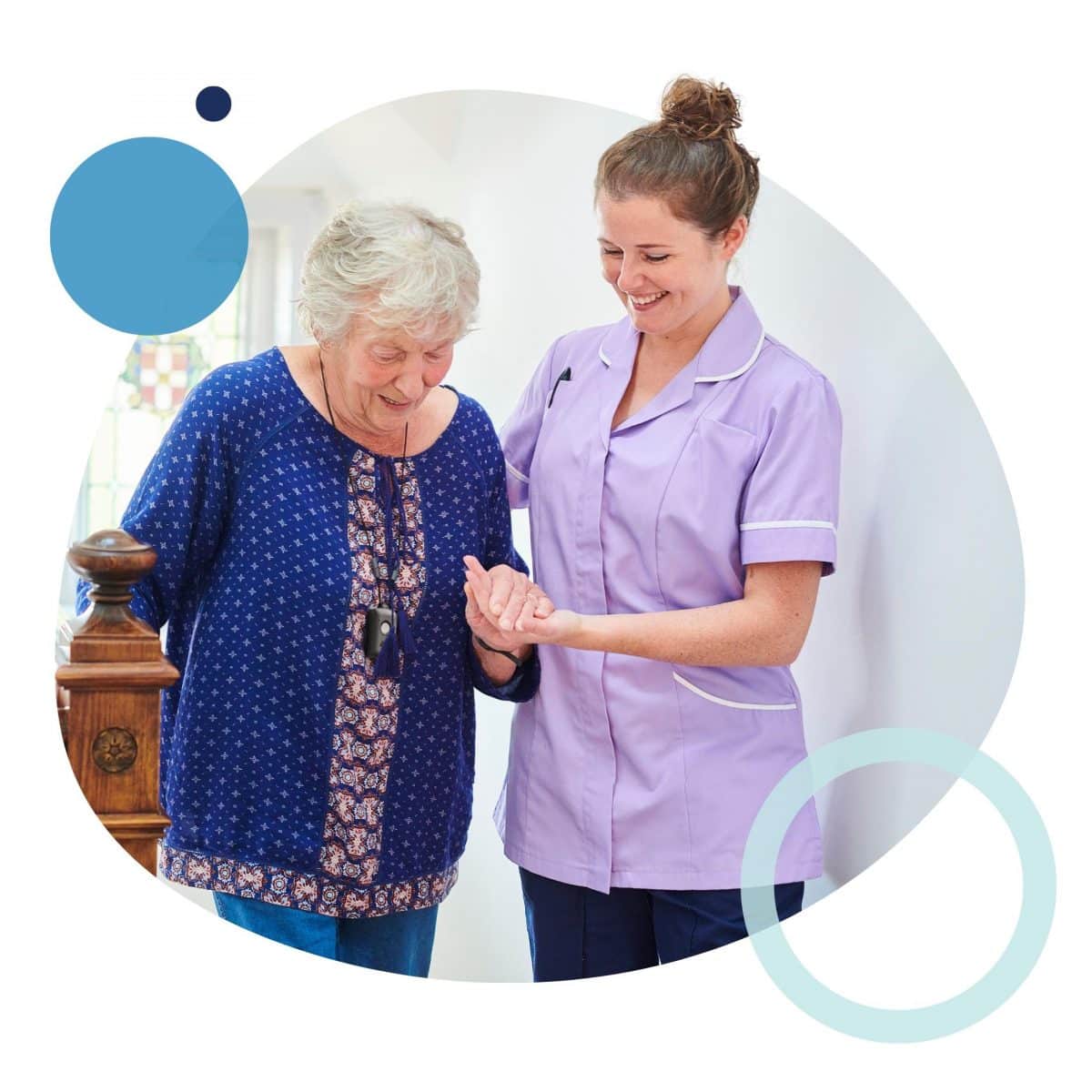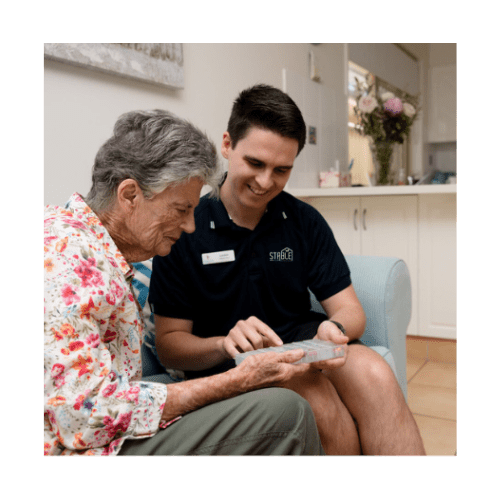How In Home Care Givers Address the Distinct Difficulties and Emotional Demands of Families Looking For Support for Their Relatives
At home caregivers play a crucial duty in navigating the intricacies dealt with by households seeking support for their loved ones. By understanding unique family characteristics and offering tailored psychological support, these professionals not just address prompt care demands yet likewise promote an atmosphere of count on and open communication. This strategy is essential in managing the emotional pressure frequently experienced by family members, as it recognizes their concerns and confirms their experiences. Nevertheless, the subtleties of this relationship prolong beyond simple caregiving; the implications for household wellness and caregiving effectiveness warrant further exploration.
Comprehending Household Dynamics
Recognizing household dynamics is essential for supplying effective at home treatment, as each family runs within an one-of-a-kind collection of communications and relationships. These characteristics incorporate different aspects, including communication designs, roles, and class structure that influence how treatment is supplied and obtained. The caregiver has to recognize these elements to make sure that care strategies straighten with the household's assumptions and values.
Various families may show distinct patterns of communication, such as hierarchical frameworks or collective approaches. As an example, in some households, a main decision-maker might hold substantial influence, while in others, decisions may be more democratic. Recognizing these patterns assists caregivers tailor their techniques to fit the family members's particular requirements.
In addition, cultural histories play an essential role fit family members dynamics. Caretakers must be culturally experienced, recognizing and respecting varied practices and beliefs that may influence care preferences.
Eventually, an extensive understanding of family members characteristics helps with improved communication, fosters trust, and boosts the caregiver's capacity to sustain the family effectively. By recognizing the intricate internet of obligations and connections, caregivers can produce a supportive setting that advertises health for both the private receiving care and the family in its entirety.
Giving Emotional Assistance
Providing emotional assistance is a vital part of in-home treatment that significantly enhances the health of both the individual getting treatment and their relative. In the context of caregiving, emotional support involves energetic listening, compassion, and validation of sensations. Caregivers are trained to identify the psychological battles that households deal with, such as sense of guilt, anxiousness, and seclusion, and to offer a thoughtful existence that eases these problems.
By promoting open interaction, caregivers create a secure space for household participants to reveal their worries and worries. This dialogue not only encourages psychological launch yet additionally enhances count on in between the caretaker and the family members. In addition, caretakers can offer useful techniques to assist families manage stress and promote resilience.

Ultimately, the emotional assistance offered by in-home caretakers improves the lifestyle for both customers and their family members, promoting a more thoughtful and understanding caregiving atmosphere. This alternative approach ensures that psychological needs are dealt with alongside physical health considerations.
Handling Daily Care Tasks
Managing daily treatment jobs is a critical facet of in-home treatment that ensures individuals obtain the support they need to keep their health and self-reliance. Caretakers play an important function in helping with tasks of daily living (ADLs), which include bathing, dressing, brushing, and meal prep work. By tackling these responsibilities, caregivers aid reduce the psychological and physical concerns that households might face while taking care of their enjoyed ones.
In addition to personal treatment, caretakers are also charged with drug management, making certain that clients comply with suggested routines and dosages. This oversight is crucial for keeping wellness and avoiding damaging impacts from missed out on or wrong medications. Caregivers commonly aid with mobility, providing support for clients relocating around their homes, thereby lowering the risk of drops and improving total safety.

Fostering Open Interaction
Efficient management of day-to-day care jobs commonly rests on the top quality of communication in between caretakers, clients, and their family members. Open communication cultivates an atmosphere where issues, preferences, and comments can be freely traded, making sure that care is customized to meet individual demands. Caretakers ought to prioritize routine check-ins with both clients and their family members, assisting in discussions that address any type of concerns or changes in care demands.
Utilizing different interaction approaches-- such as face-to-face conferences, phone telephone calls, and written updates-- can improve understanding and give households with comfort. It's important for caretakers to actively listen, showing compassion and respect for the psychological landscape of the household. Motivating questions from family participants can likewise help make clear care strategies and strengthen the caretaker's commitment to transparency.
In addition, maintaining open lines of communication enables caregivers to identify and react promptly to any changes in a customer's wellness status or emotional well-being. This positive technique not just reinforces the caregiver-client vibrant yet also equips households to get involved actively in the care process. Ultimately, promoting open interaction is essential for improving the high quality of at home treatment and promoting an encouraging atmosphere for all included.
Structure Depend On and Relationships
Trust fund is the keystone of effective in-home care, as it develops a structure for purposeful relationships in between caretakers, clients, and their households. Building this count on requires constant, clear interaction and a real commitment to the wellness of those included. Caregivers have to show integrity through punctuality, adherence to care strategies, and responsiveness to the needs and preferences of clients.
To foster trust, caretakers must take part in active listening, making certain that households feel listened to and comprehended. This involves not just resolving instant concerns yet likewise anticipating future demands, consequently equipping families and boosting their sense of control. Developing relationship via shared experiences and considerate interactions go right here can additionally strengthen these connections.
Additionally, caretakers have to be educated to recognize and attend to the emotional complexities site link faced by households. By showing empathy and concern, they can minimize concerns and unpredictabilities, reinforcing depend on. Regular updates and check-ins with relative can additionally enhance openness, permitting them to feel engaged and informed regarding their loved one's care.
Inevitably, building trust fund and nurturing connections in at home care is a joint process that dramatically impacts the top quality of care supplied, cultivating a supportive atmosphere that profits everyone included.
Verdict
In-home caretakers play a critical function in resolving the unique difficulties and psychological needs of households. By understanding household dynamics, supplying psychological support, and promoting open interaction, caregivers improve the total caregiving experience. Their capability to take care of daily care jobs while building depend on and solid relationships grows an encouraging setting that site for clients and their households. Inevitably, the compassionate interaction of caretakers substantially contributes to enhanced wellness and resilience for those navigating the complexities of caregiving.
Recognizing household dynamics is essential for offering effective at home treatment, as each household operates within an one-of-a-kind set of interactions and relationships.Supplying psychological support is a necessary part of in-home treatment that considerably boosts the health of both the specific receiving treatment and their family participants. By taking on these obligations, caregivers aid minimize the psychological and physical concerns that family members may face while caring for their liked ones.
Effective administration of daily care jobs usually hinges on the top quality of communication between caregivers, clients, and their households - in home caregivers.Trust is the keystone of effective in-home treatment, as it develops a foundation for purposeful partnerships between caretakers, clients, and their households